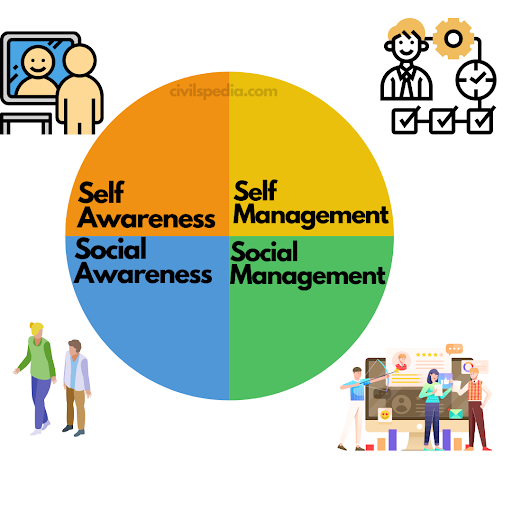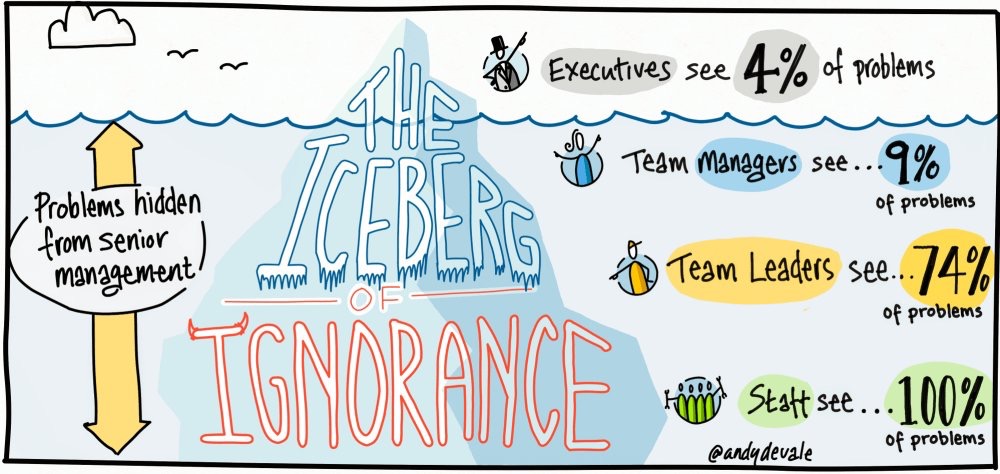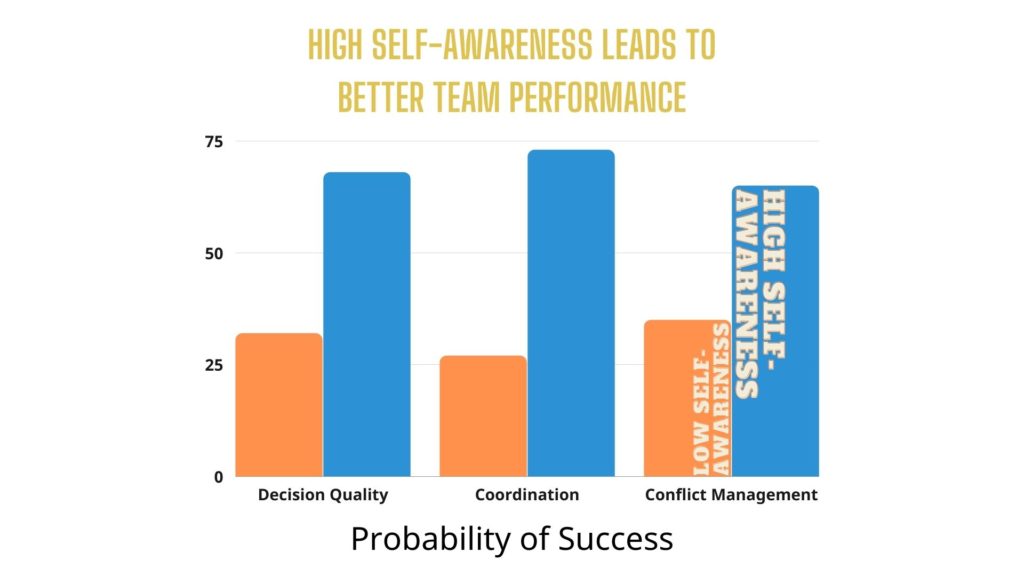What is self-awareness?
Self-awareness is commonly considered as one of the pillars of emotional intelligence (EI). With emotional self-awareness, we recognize our own emotions and understand how they interact with our mindsets and behaviors. We sense how others see us and our self-image reflects that larger reality. We value our merits and defects, which boosts our self-esteem. It also gives us a sense of purpose, so we can be more decisive in setting a course of action.

Many theories and thinkers have attempted to exploit the multiplier effect of self-awareness on the performance of leaders. In response to a question regarding which characteristic in a leader directly correlates with their leadership success, psychologist and author Sherrie Campbell perceives that self-awareness is the key. Indeed, this soft skill is one of the principal elements of managerial capabilities that anticipate managerial effectiveness, ultimately driving leadership success.
Many leadership problems are driven by low self-awareness.
Bill Hybels
How self-awareness amplifies leadership potential?
Instilling a great leader within us
Being perceptively in tune with our subconscious mind can do wonders for personal leadership growth. Cam Caldwell, Ph.D., a professor at the University of Illinois at Springfield, highlights humility and progressivity as the dominant character traits associated with self-aware leaders. In other words, they are well aware of the fact that they might make irrational decisions from time to time, so they are constantly on the lookout for improvement. The more leaders feel comfortable admitting their flaws, the better they are at resolving pride bordering arrogance – the root cause of leadership blind spots.
Although most people believe that they are self-aware, true self-awareness is a rare quality: only 10% – 15% of the participants in a research by Dr. Tasha Eurich and her team actually had what it took to be labeled self-aware. It is also drawn that expertise does not necessarily help us with becoming more self-aware. Quite the contrary, it can mislead us into a false sense of confidence about our performance. For instance, one study indicated that more experienced managers were less accurate in evaluating their leadership effectiveness in comparison to less experienced ones.

At its core, self-awareness equips leaders with far more than a powerful tool for success. In this VUCA world, self-awareness plays an essential role in creating a healing space where our soul can finally achieve inner peace. It reminds us of why we wanted to become leaders in the first place, helping us discover and realize the impact we long to exert, not on our team members or even our organizations but on an international level.
Boosting team performance
Not only does developing self-awareness contribute to self-development, but it also enhances organizational outcomes as a whole. A study conducted by DePaul University’s College of Business provided a crucial link between self-awareness and team performance. Teams with a high level of self-awareness proved superior decision-makers, more effective communicators, and were markedly better at handling tensions and conflicts.
High self-awareness increases the rate of success in terms of:
- Decision quality: 68 percent
- Coordination: 73 percent
- Conflict Management: 65 percent

When leaders and their team intentionally pursue self-awareness, other levels of awareness naturally follow. Often, leaders with high self-awareness will attempt to weave open communication into team culture to filter any underlying issues that might derail the project. This creates an ideal environment in which team members become increasingly aware of their own strengths and weaknesses, as well as how these affect the whole team. It provides them with a common language to comprehend team behaviors, which is crucial to maintaining a harmonious team balance and effective responsibility delegation.
Major impediment to self-awareness development in centennials
Centennials grew up with a smartphone in hand, social networks are a way of life. They communicate via messages and emojis and have no memory of a once disconnected world. In fact, my 6-year-old cousin was glued to her smartphone last week and would refuse to finish her meal without it. I remember when I was her age, my brother and I were playing hide-and-seek nonstop with the other children in our neighborhood until our mom turned up, ready to give us a good spanking.
A study in technology exposure in children pointed out that:
- Children’s access time spent on mobile is higher and continues to grow than in previous years
- The average time spent on mobile has tripled among children
- Traditional screen time has decreased drastically
- Digital educational content continues to grow
These days, a plethora of juveniles are suffering from symptoms attributed to technology withdrawal. Often, they experience sadness, anxiety, restlessness, or even irritability when separated from digital devices or deprived of internet access. They cannot reduce the time spent on those devices notwithstanding the problems they cause. They lose interest in real-life activities that they previously enjoyed. Some might even ignore personal hygiene, eating, and other forms of self-care.

I cannot stress enough the significance of the digital revolution. From education to healthcare, it has entirely transformed our lives, but at what cost? Living in the age of information, we are experiencing what is called the innocence lost. Ever since communication technology emerged, it has become more and more challenging for anyone to be alone with their own thoughts. Centennials, in particular, are the hardest hit by this phenomenon.
A recent survey of adolescents without the symptoms of ADHD at the beginning of the study has drawn a link between a more heavy media diet and symptoms of ADHD, a brain disorder that makes people prone to acting impulsively and having trouble with concentration, after 24 months of follow-up. While we are not looking, repetitive attentional shifts and multitasking are sneakily eating away our ability to focus. The digital stimuli spark excitement – a dopamine squirt – that can be addictive. Without it, people feel bored and discouraged from getting back on track.
Likewise, ongoing stimulation is highly responsible for centennials’ low self-awareness, in that it prevents them from concentrating on themselves. They have to process a considerable amount of information on a daily basis but lack the ability to block out the chaos. This can easily lead to overwhelming disorientation – feelings of confusion about where they are heading or what is going on.
The rise of technology is creating more bubbles, where people see a restricted view of realty and lose the ability to view things objectively.
Maddy Keating
Of course, this was not always the case. Before the advent of big data, life was enormously different. Tedious as it may sound, people used to go through hours of their life without any digital devices to keep them company. However, it was in those lost hours that they found the freedom to let their mind wander and reflect deeply on themselves. Unfortunately, extensive tech exposure has deprived youths of the precious opportunities to work on their self-awareness.
Fundamental ways to attain self-awareness
Strengthening social bonds
It is no coincidence that reality shows exploded in popularity after the invention of social media. Before the internet, who would have thought we would want to watch someone just like us. Look how far we’ve come. Now, we’re the ones watching because we’re not seeing people like ourselves anymore; rather, we’re seeing the people we used to be. Doubtlessly, it is impossible to travel back to the good old days when electronic devices had not come into existence, however, a recommended alternative is to replace some screen time with people time. We must start engaging more in social connections and establishing stronger relationships. That way, we will better know who we are and where we stand in our community.
Introspection
Another practical way of cultivating this skill is through embracing the habit of introspection – examining the causes of our feelings, thoughts, and behaviors. The problem is, most people are doing it wrong, which results in their reporting even worse job satisfaction and well-being despite introspecting regularly. For us to acquire a profound insight into this method, here is a video about how to increase self-awareness by Dr. Tasha Eurich in collaboration with TEDx Talks.
IVolunteer International is a 501(c)3 tech-nonprofit registered in the United States with operations worldwide. Using a location-based mobile application, we mobilize volunteers to take action in their local communities. Our vision is creating 7-billion volunteers. We are an internationally recognized nonprofit organization and is also a Civil Society Associated with the United Nations Department of Global Communications. Visit our profiles on Guidestar, Greatnonprofits, and FastForward.


